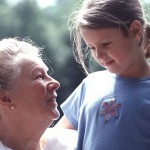How can you be happy without a lot of material things? Families are dealing with that problem today.
The experts on the issue are oldest Americans, the last surviving witnesses to the Great Depression. Bonita, 96, tells about a childhood most of us can hardly imagine. Living on very little, Bonita, her family, and her friends found it possible to be very happy.
Here’s her story:
People now think they need so much to be happy. We were happy in my family, and just think of what we didn’t have!
To give you an idea of what we lived without, here are a few practical things that I have had to learn over my life:
• To use electric lights rather than kerosene lamps.
• To use electric stoves and later a microwave oven instead of a wood stove.
• To use an electric washing machine instead off a scrub board, boiler on the stove, and three galvanized wash tubs.
• To use an electric clothes dryer instead of hanging the clothes on the line outside.
• To have a faucet in the kitchen rather than getting water by the pail-full from a spring in the meadow a fourth of a mile away.
• To have an indoor bathroom rather than taking a bath in the wash tub in front of a kitchen wood stove.
• To have toilet paper rather than an old Sears and Roebuck catalog.
• To use an indoor toilet rather than the privy behind the house.
• To live in a home with an electric iron rather than a sad iron heated on the stove.
• To listen to a TV rather than a Victrola.
• To answer the telephone when it rings rather than having to check out the special ring on a party line.
• To use frozen and prepared foods from the store rather than baking bread and eating garden and home canned foods.
• To buy ready-made clothes in a store instead of those made by a dressmaker who came to our house.
There are so many things people take for granted today, that we didn’t have. For example, life without a bathroom is hard to describe. One has to live it to know what it is like. Our bathing in those days was done in a basin of water that we carried to our bedrooms. In the winter, this meant trying to undress as near as possible to the stovepipe which added a bit of heat to the bedroom. During the winter, Mother tried to see to it that we each had a bath of some sort once a week. In the morning we washed a bit in the kitchen.
Our toilet was a small shed about six feet square. They were always built with three holes so daily trips to the privy often meant that it could be a social affair. My other memory of this building is of the swarms of flies in the summer. They buzzed and hummed around beneath you and kept you company whenever nature called you to this place.
The other big job before running water was doing the family washing for ten people. It started on Sunday night when a big copper wash boiler had to be filled with water from the spring up in the meadow. This would bring the water up to the room temperature during the night. Then Mother would heat the water to boiling on the wood stove. All the white clothes were boiled first and then washed. It was supposed to be more sanitary to boil the sheets and underwear. Then the hot clothes were removed with a “clothes stick”- a long bleached pole- and carried by the pail-full to the back wash room where we had three galvanized tubs on a large bench. In one tub, we rubbed the clothes on a wash board with Fels Naptha Soap. We rinsed the clothes in the second tub and then put them thru bluing water which seemed to counteract the yellowish color that the clothes often had.
The four older girls all took turns at the wash board in 15 minute shifts. The clothes were put through a hand wringer that had two rubber rollers and squeezed out some of the water. The clothes were then hung outside on a clothes line in the side yard or on the porch in the winter. I can see the long underwear during the winter as it froze stiff almost as soon as it was put on the line. Later in the day we had to bring the clothes back into the house and thaw them out and finished drying them on racks by the wood stove. The clothes really did smell sweet and clean after being out in the fresh air. Mother’s hands were always cold and sore as she went out on those cold winter days to hang out the clothes. Often she would heat the wooden clothes pins in the oven so that they would warm her hands for a few minutes.
Ironing was started on Tuesday and often took all week to do. Flat irons called “sad irons” were heated on the stove and then wiped on a cloth containing paraffin. I think this was to wipe off any smoke from the stove and to make the irons slide easier. We had both irons with handles fastened to the iron and detachable handles which we preferred. As the iron cooled off it had to go back on the stove and we’d try to find a hotter one to use. In those days we always ironed the sheets and pillowcases, and usually had two tablecloths along with everyone’s personal clothes. It was a really big job.
This house was lighted with kerosene lamps. They were smoky and smelly. On Saturday we had to collect all of them and wash the chimneys, rinse them and dry them. The wicks had to be trimmed. The base of the lamp was filled with kerosene and then the lamps were each returned to the rooms where they belonged. The light that they produced was not very good.
The lamp was usually placed in the middle of our large dining room table and at night we all sat around it to do our homework. The older members of the family checked on the younger ones to see that pages of addition were completed and correct or that we had memorized our spelling words for the next day. We practiced our reading assignments by reading to some older member of the family from our reading books. Our teachers wanted each of us to memorize a short poem each week and we were expected to recite it in front of the class during a Friday afternoon assembly. “October’s Bright Blue Weather” and “Robert Reese” were two of my favorites.
With no television or record players, we had to make our own fun and entertainment. When we were through working on our school work for the next day, we often played games. We had checkers, dominoes, caroms, and card games like flinch, authors, concentration, and spit. Sometimes we played hide the thimble or spin the platter. We loved to play dress-up in the old clothes that were sent to us from relatives in California or the Lessells family in New York. We had names like Mrs. Colburn and Mrs. Osborn and would talk to each other at great length about our children, our husbands, and our lives while dressed in long black skirts, fancy lace blouses, and pretty old evening dresses form our relatives who were a bit better off than our family financially.
 Harry is 81 years old and having a great time. He offers his advice for successful aging. He conveys the kind of exuberance and joy I discovered in many of the elders I interviewed.
Harry is 81 years old and having a great time. He offers his advice for successful aging. He conveys the kind of exuberance and joy I discovered in many of the elders I interviewed.








